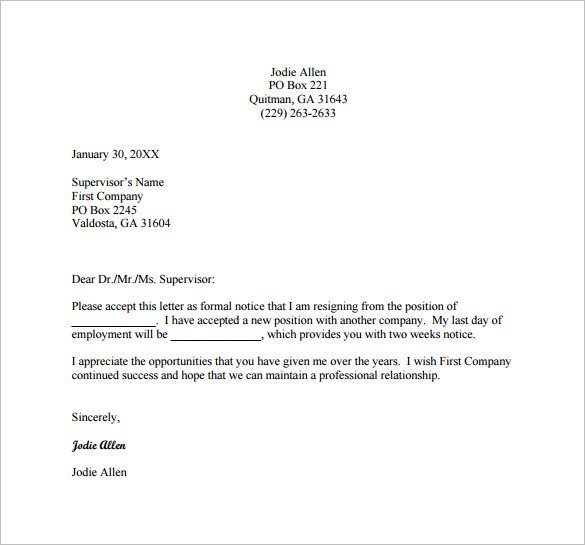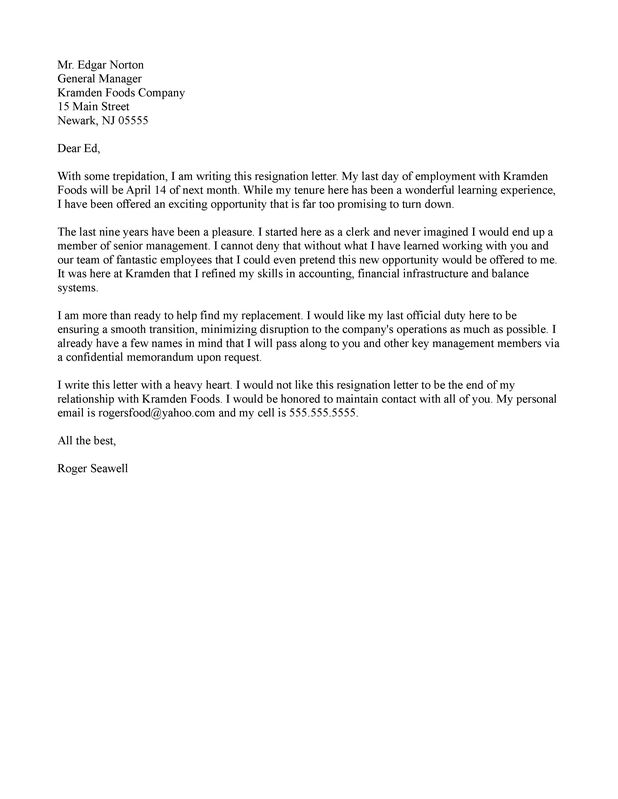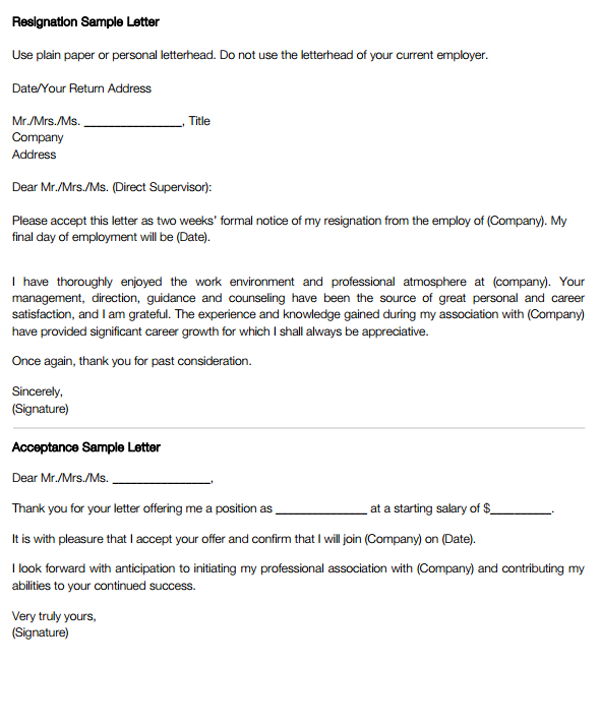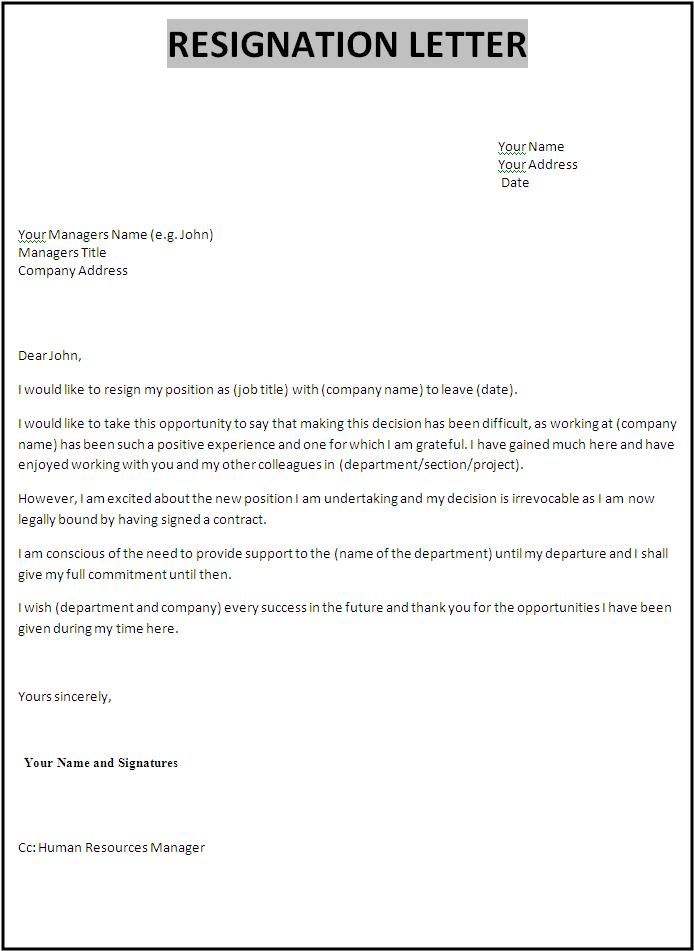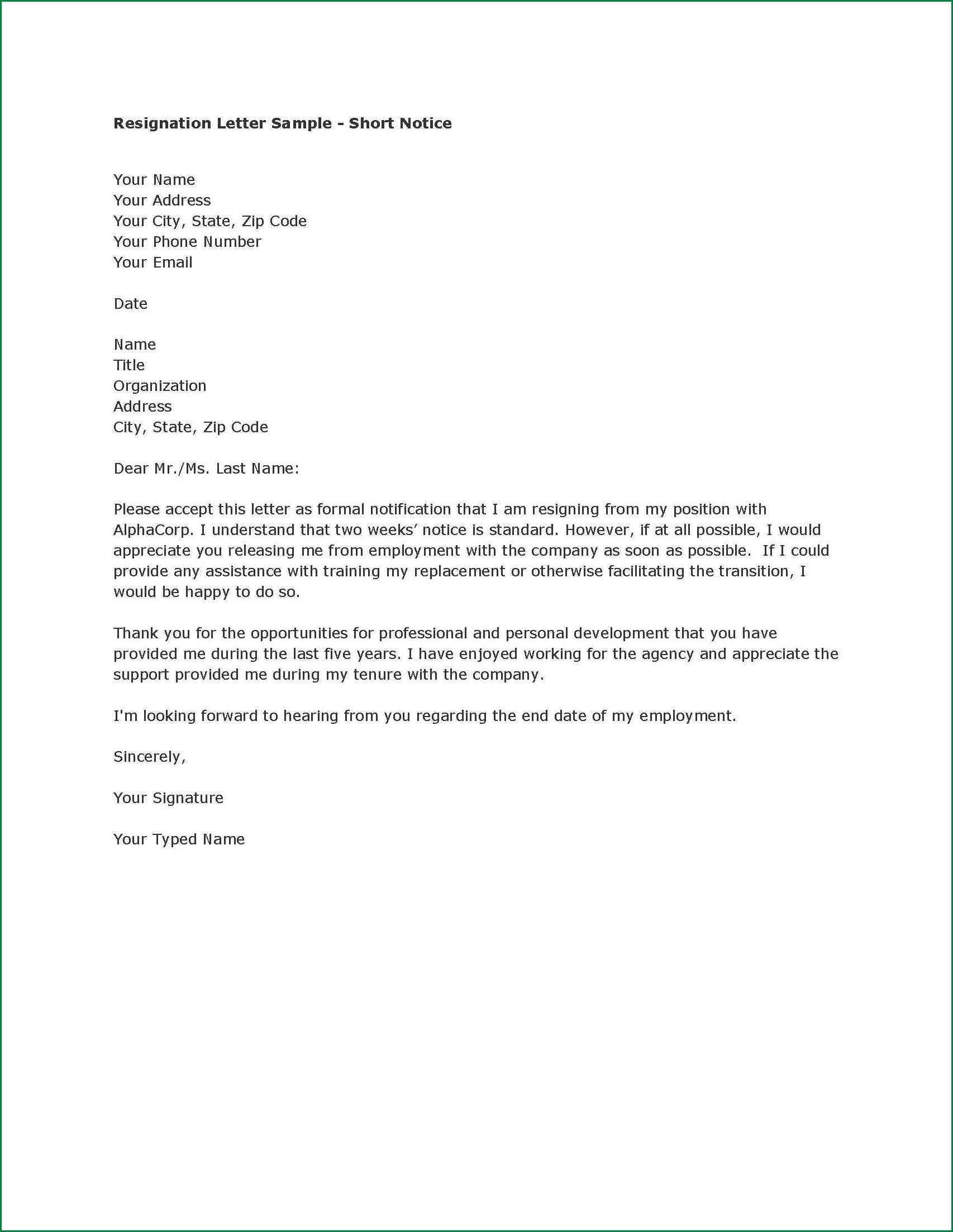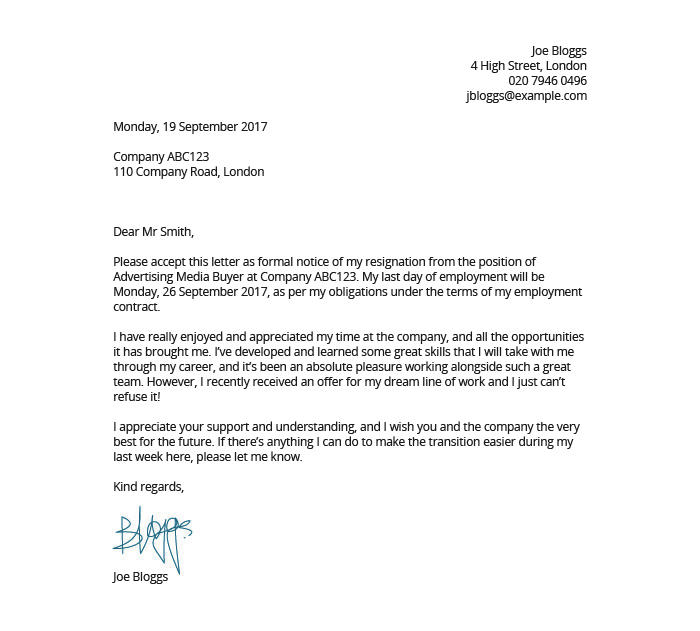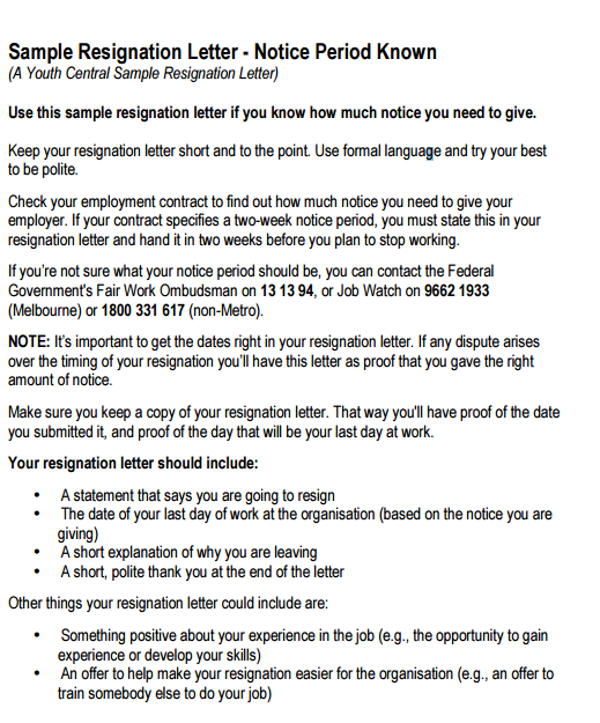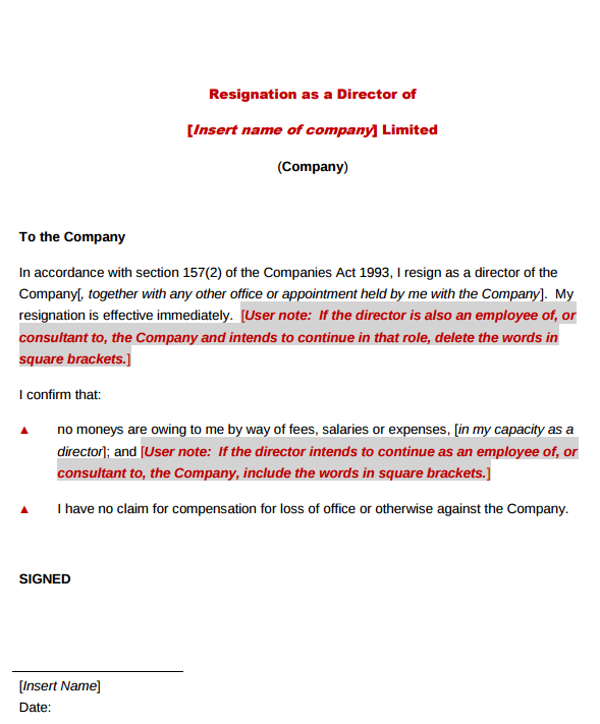A good job grants you more than just monetary perks and privileges, but a continuous learning experience to enhance your abilities and skills in a particular craft. Yet seldom, the job that you initially desired no longer ignites the same spark that lived inside of you during the very start of your journey, or maybe the company you work for has failed to acknowledge your capabilities and expertise in the field. Whatever the reason may be, a formal and graceful exit through a professional resignation letter would be your best option.
Letter of Resignation Example
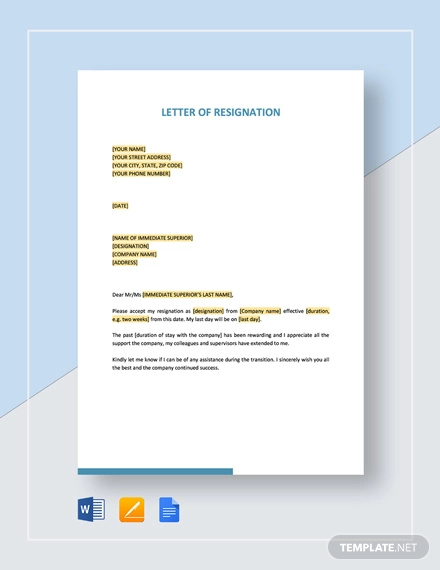
It is important to keep things professional with your company when it comes to submitting a resignation letter. This is why, to help you out, we recommend you use our “Letter of Resignation” template that comes with ready-made content. Using this standard resignation letter example, you will be able to explain the reason behind your resignation convincingly and effectively. Download it now and be able to draft your letter in no time!
Restaurant Employee Resignation Acceptance Letter

Create an acceptance letter that is professionally written in response to the resignation letter submitted by your employee by making use of our “Restaurant Employee Resignation Acceptance Letter” template. This template is editable and customizable in different file formats for added convenience. Avail this template now! You may also check out examples on how to write a retirement resignation letter.
Free Resignation Letter Format
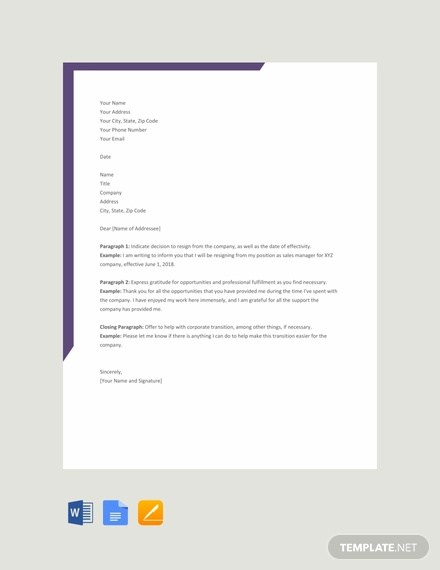
Feel free to download and use this high-quality letter format template that allows you to come up with a formal resignation letter in no time. Upon downloading, you can instantly edit the highlighted content by opening this file in either MS Word, Pages, or Google Docs. You may also see heartfelt resignation letters.
Free Professional Resignation Letter Example
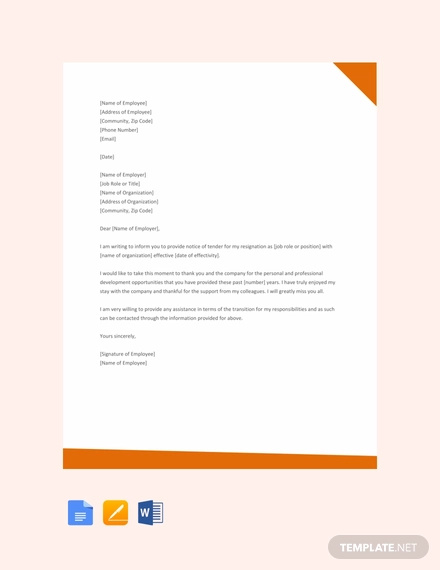
Free Official Resignation Letter
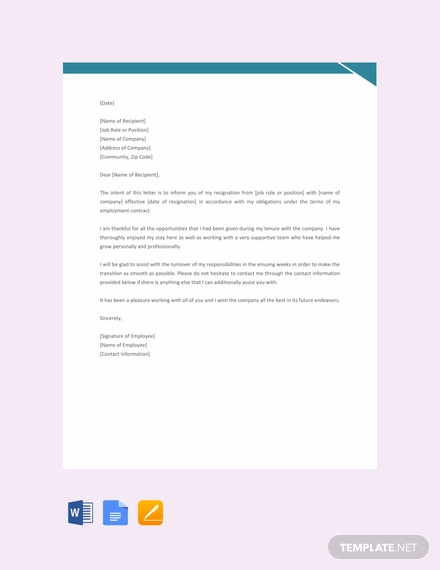
Free Casual Resignation Letter
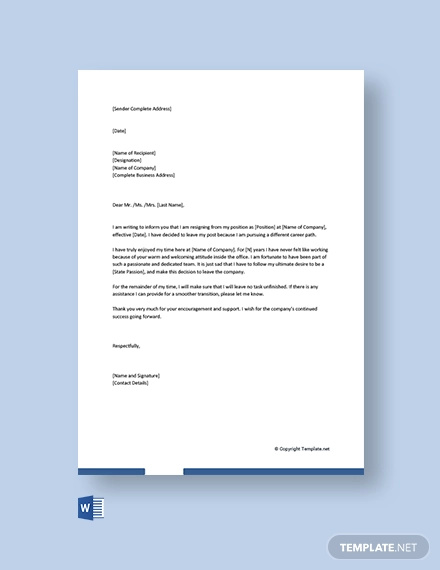
Free Professional Resignation Letter With Regret Template
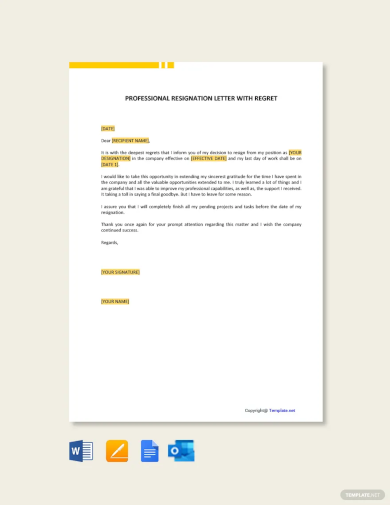
Resignation Letter to Company Template

Resignation Letter to Client Template

Resignation Letter Template for Personal Reason

Resignation Letter Template for Career Growth
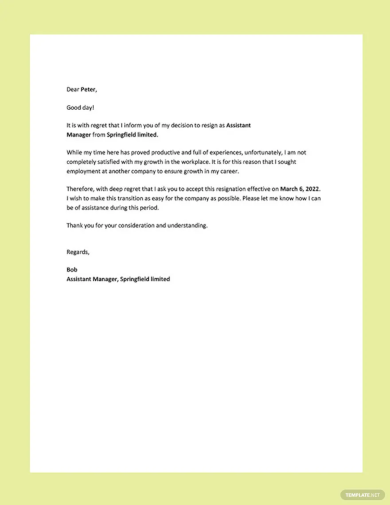
Resignation Letter Template Due to Study
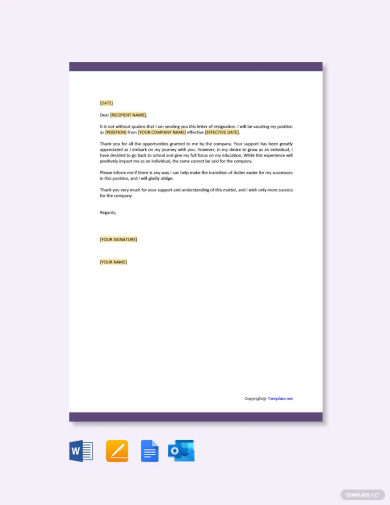
Resignation Letter Template Due to Travel
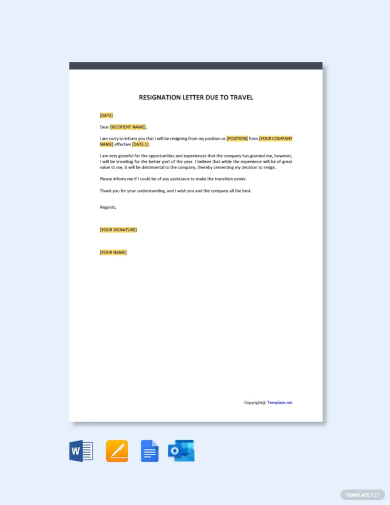
Resignation Letter Template Due to Health Issues

Resignation Letter Template due to Pregnancy

Resignation Letter Template for Teacher
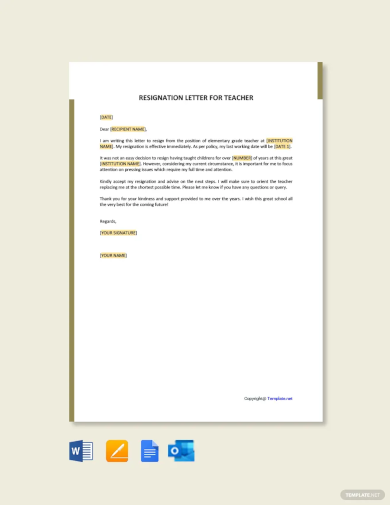
Resignation Letter to Boss Template
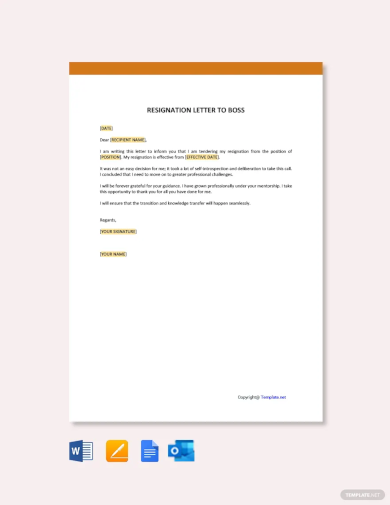
Resignation Letter Format for Bank Employee Template
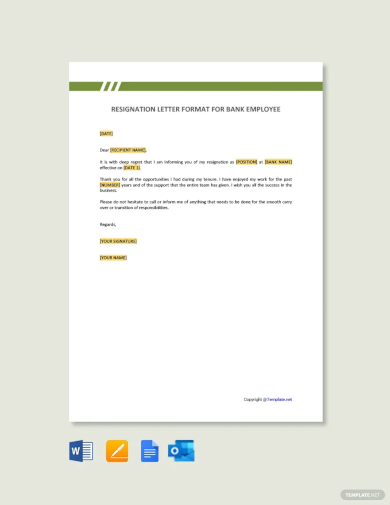
Resignation Letter for Private Company Template
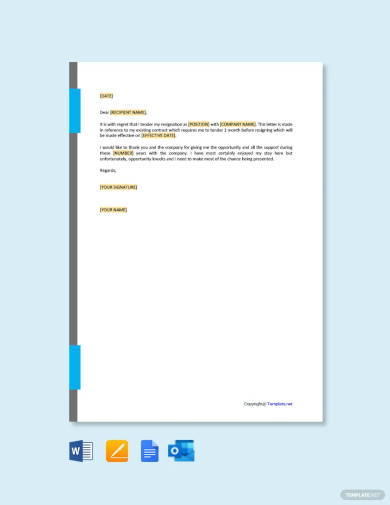
Resignation Letter With 30 Day Notice Template
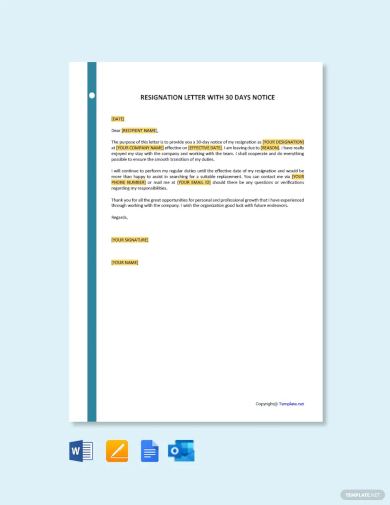
Resignation Letter with Regret Template
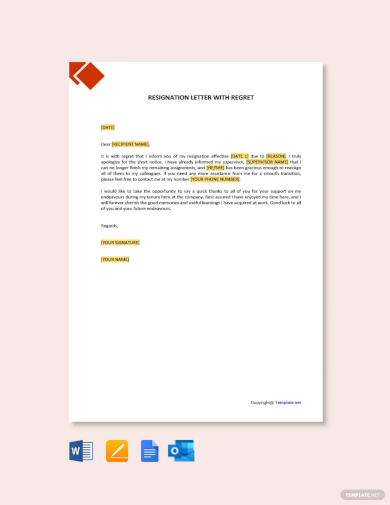
2 Week Resignation Letter Example
Blank Professional Resignation Letter Example
Signs You Should Leave Your Job
Don’t feel bad about leaving your job. Sometimes, staying with your current employer can be a toxic experience. There are many factors that can influence one’s perception towards their job, whether this concerns their employer or the tasks and responsibilities held by the respective job position.You may also see manager resignation letters.
So when exactly do you decide between leaving?
The answer to this question depends on your current state — both personally and professionally. If you’re debating whether this is a decision you should make or not, try contemplating the following symptoms:
1. It Sucks the Life Out of You.
You feel drained — physically, mentally, emotionally, and maybe even spiritually.
There are times when you just feel genuinely unhappy with your job. This might not have anything to do with your employer, nor your job function, but with deadlines to meet, expectations to live up to, and a hectic schedule and timeline to follow — it can all get a bit overwhelming. You may also see employee resignation letters.
You may benefit from every other aspect of the job, but ultimately, if your career goals lie elsewhere, your current job could milk out every ounce of motivation in you, and there is nothing that this poor job could ever do to make things better.
If your aspirations lie somewhere outside the world you’ve been orbiting for years, maybe your heart is telling you to follow a different path. You may also see no notice resignation letters.
2. You Feel Anxious and Over the Edge.
When sales begin hitting rock-bottom, several outlets are slowly being shut down, and the number of closed-door meetings is gradually increasing, you might want to be the smart employee and take this as a sign to quit your job.
This is a common case that many companies suffer from. When a sudden change in the market greatly impacts business operations, the organization could experience extreme losses, which would eventually affect its internal sectors as well. For the average employee, a volatile environment is never a good sign. You may also see short notice resignation letters.
So when push comes to shove, you might want to start updating your resume just in case.
3. It Fails to Showcase Your Strengths.
You have a lot to offer the company, but your drive to keep these skills alive is hanging by a loose thread.
Perhaps your current job requires more of your least developed skills rather than your actual strengths. Say, for example, you’re a graphic artist who landed a job in the marketing department of a well-established firm.
While the paycheck may be more than what the job demands from you, it still comes as a complete disappointment. Rather than spending your time exploring the digital arts of marketing, you find yourself creating written reports for the given sector. Not only is this putting your strongest talents to waste, but it’s also taking a huge toll on your performance. You may also see two weeks’ notice resignation letters.
4. Opportunities Pass You By.
A few years have passed, but it feels like your career is headed nowhere. Every time you apply for a promotion, someone else gets the position before you. You strive to meet the requirements needed to step it up a notch, only to find yourself back in the same spot. In this fast-changing world, your pacing at a speed that even a turtle can beat. You can also check out our application letter examples & samples.
Though looking for a job is no easy task, it’s better to spend your time looking for a job that sees your potential than to be stuck in a company that fails to value your efforts. Who knows, maybe your exceptional qualities and work ethics could be put to good use elsewhere.
5. The Unfitting Change in Culture.
When you first joined a company, it had a fun, laid-back corporate culture that convinced you to stay. You excelled in an environment that allowed you to grow as a professional through various tasks and activities that embraced the nature of your job. You might be interested in reference letter examples.
But something changed. The company was bought by a larger firm that imposed strict organizational policies that took over the company’s entire operations. Now, you can hardly approach your new boss without setting an appointment with the secretary beforehand. Or perhaps new company rules have restricted employee interactions during working hours, forcing everyone to work like robots for eight hours straight. You may also like notice letter examples.
While adapting to these changes demands time and patience, if you’re no longer happy or comfortable with your current position, then don’t hesitate on leaving.
Food Service Resignation Letter Example
Resignation and Acceptance letter
How to Leave Your Job Professionally
Resigning from your job is a moment that many people resent, but it’s certainly something that needs to be done before you can formally part ways with the company.
With that said, here’s some useful advice on how you can carry out your resignation professionally:
1. Choose the Right Moment.
It’s never a good idea to leave your job while everyone around you is under pressure with tight schedules and strict deadlines to meet. When choosing the right time to announce your resignation, make sure your boss isn’t on a time-crunch with folders and documents scattered all over his or her desk. You may also see official resignation letters.
Also, don’t quit your current job unless contracts have already been signed with your new employer. There may be issues with the contract that do not suit your interests, and this could leave you jobless for months.
2. Be Gracious.
Avoid informal communication methods that fail to meet corporate standards. For instance, leaving a note on your employer’s desk to inform them of your resignation is childish and unethical. It can be seen as disrespectful in most corporate settings. Refrain from sending an email resignation or using the telephone to contact your employer, unless you plan on submitting a resignation letter in person as well.
3. Consider Your Notice Period.
Though a two weeks notice is common in most organizations, some companies may have their employee policies to abide by. This could be anything from two weeks to three months, depending on your current position and your time with the company. Throughout this period, make sure you maintain an appropriate attitude and productivity.
As for immediate resignations, you might want to arrange a formal meeting with your boss and HR to explain your situation and reach a mutual agreement.
4. Don’t Make it Difficult for Colleagues.
When you leave a company, you could also be abandoning certain projects and assignments that a colleague or replacement would have to finish. When this happens, you want to make sure they know how to handle the responsibility being handed over to them. You can prepare a guide for them to refer to during the turnover, or allow them to contact you whenever problems persist. Clients and recurring customers must also be informed of your departure beforehand.
5. Make it Brief.
When providing a reason for your departure, you can keep it as brief as possible without going too much into detail. It could be due to a new job opportunity, a higher payroll, a more varied role, or perhaps a medical or personal reason you’d rather not disclose any further. You might be interested in appointment letter examples.
New Standard Resignation Letter Example
Professional Short Notice Resignation Example
Tips for Writing a Resignation Letter
Once you have made the decision to quit your job, the only professional way to handle this is through a well-written resignation letter. Not only can this ease the transition over your last few days on the job, but it will also help you maintain a positive relationship with your employers and colleagues even when you are no longer a part of the company. You may also see temporary resignation letters.
For this reason, writing a professional resignation letter must be taken seriously. To guide you through this process, refer to the following tips:
1. Keep it short and to-the-point. Stop beating around the bush and focus on delivering your message. The letter should be simple, direct, and positive. It must indicate information relating to when you propose to leave along with a brief message of thanks. So if you’re having trouble constructing your letter, then a short resignation letter would do.
2. Use formal language. Since resignation letters are meant to be professional, then using a formal tone, structure and layout are essential. Address your recipient politely, and choose your words carefully.
3. Be positive. There’s no point in criticizing your employers when you’re likely to never cross paths ever again. You need to be confident with your decision to move on to greener pastures, yet appreciative enough for the opportunities that were given to you. You need to leave a positive impression to gain a good recommendation for your next employer.
4. Express your gratitude. You don’t need to provide special mentions for the people who have made your stay worthwhile. Instead, you can insert a short message of thanks to express your utmost gratitude towards the company for giving you a one-of-a-kind learning experience that has shaped the person you are today. You may also see resignation checklists
5. Proofread the letter. Ensure that you have reviewed the letter multiple times before sending it. You can have a friend or colleague criticize the letter to identify any mistakes that you may have overlooked. The content of your letter should emphasize your appreciation for the opportunity given, as well as a clear indication as to why you have decided to leave. You may also see resignation emails.
Thankful Resignation Letter Example
Sample Resignation Letter
Director Resignation Letter
Unlike in past decades, it is fairly common for individuals to change jobs every five years or so to explore new possibilities in their careers.
However, knowing how to handle these transitions correctly is a vital skill to possess to maintain professionalism. With this in mind, it’s important to follow the policies set by the company when dealing with employee resignations. This includes the notice period from when you send your resignation letter, as well as your performance leading up to your formal departure from the company. You may also see resignation notices.





